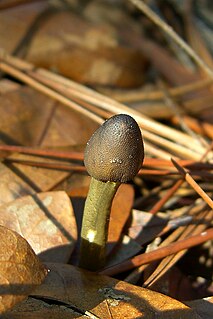
The Hypocreales are an order of fungi within the class Sordariomycetes. In 2008, it was estimated that it contained some 237 genera, and 2647 species in seven families. Since then, a considerable number of further taxa have been identified, including an additional family, the Stachybotryaceae. According to the Catalog of Life, As of April 2021 the Hypocreales contains 6 families, 137 genera, and 1411 species.
Scutula is a genus of lichenicolous fungi in the family Ramalinaceae.

Chlorociboria is the sole genus of fungi in the family Chlorociboriaceae. The genus includes 23 species.

The Catillariaceae are a family of crustose lichens in the order Lecanorales. Species of this family have a widespread distribution, especially in temperate areas. The family was originally circumscribed by Austrian lichenologist Josef Hafellner in 1984.
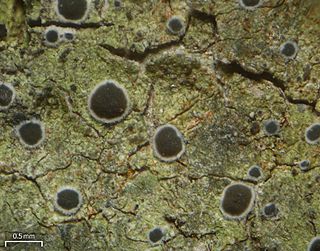
The Pilocarpaceae are a family of crustose lichens in the order Lecanorales. The species of this family have a cosmopolitan distribution and have been found in a variety of climatic regions. Pilocarpaceae was circumscribed by Alexander Zahlbruckner in Adolf Engler's influential 1905 work Die Natürlichen Pflanzenfamilien.

The Ostropales are an order of fungi in the class Lecanoromycetes. The order was circumscribed by Swedish botanist John Axel Nannfeldt in 1932. The order contains 4 families and 46 genera, including 6 genera of uncertain familial placement.
Lueckingia is a genus in the family Ramalinaceae. It is a monotypic genus, containing the single corticolous lichen species Lueckingia polyspora. The genus and species were described as new to science in 2006. The species, known only from Costa Rica, was originally found growing on bark in the shaded understory of a lowland rainforest. The genus name honours lichenologist Robert Lücking, who organized the field trip that resulted in the discovery of the new species.
Badimia is a genus of foliicolous (leaf-inhabiting) lichens in the family Ramalinaceae.
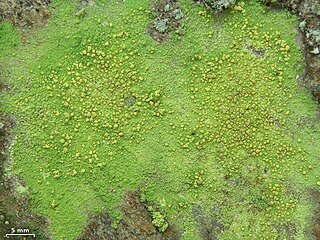
Psilolechia is a genus of four species of crustose lichens. It is the only member of Psilolechiaceae, a family that was created in 2014 to contain this genus.

Herpotrichiellaceae is a family of ascomycetous fungi within the order Chaetothyriales and within the class Eurotiomycetes. It contains 16 genera and about 270 species. The type genus of the family, Herpotrichiella, is now synonymous with Capronia.
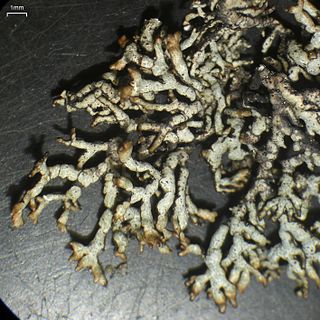
Brodoa is a genus of three species of foliose lichens in the family Parmeliaceae. The genus, circumscribed in 1986 by Trevor Goward, is named in honour of lichenologist Irwin Brodo.

Melanelia is a genus of lichenized fungi in the family Parmeliaceae. The genus was circumscribed by Ted Esslinger in 1978.
Unguiculella is a genus of lichen-forming fungi in the family Cordieritidaceae. A total of 17 species fall under this genus.

Leptogium is a genus of lichen-forming fungi in the family Collemataceae. It has about 110 species.

Protoparmelia is a genus of lichenized fungi in the family Parmeliaceae. The genus has a widespread distribution, and contains 11 species. Protoparmelia was circumscribed by French lichenologist Maurice Choisy in 1929.

Ustilaginoidea is a genus of fungi in the family Clavicipitaceae. The genus contains 19 species. Ustilaginoidea was circumscribed by German botanist Julius Oscar Brefeld in 1895, with Ustilaginoidea oryzae assigned as the type species. Ustilaginoidea virens causes the disesase known alternatively as rice false smut, pseudosmut, or green smut.
Xenonectriella is a genus of lichenicolous fungi in the family Nectriaceae. The genus was circumscribed by lichenologist Josef Karl Weese in 1919, with Xenonectriella lutescens assigned as the type species.
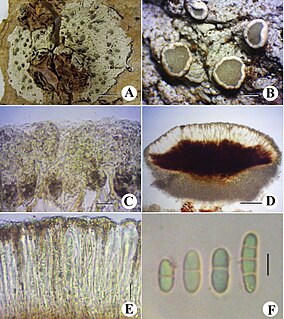
Kalbionora is a lichen genus in the family Malmideaceae containing the single crustose species Kalbionora palaeotropica. This lichen occurs in coastal forests in Thailand, Vietnam, and northeastern Australia, where it grows on tree bark.

Strigulaceae is a family of lichen-forming fungi, one of two families in the order Strigulales. Recent (2020) molecular analysis of the type genus, Strigula, has led to a reallocation of the foliicolous species into six genera that correspond to well-delimited clades with diagnostic phenotype features.

Cordieritidaceae is a family of fungi in the order Cyttariales. Species in this family are saprobes or lichenicolous.















